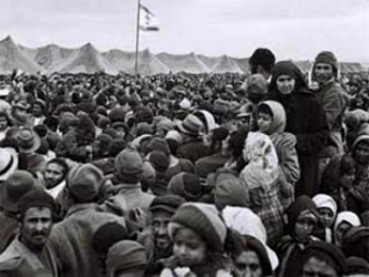The day of hatred By German Sadulayev, special to Prague Watchdog
St.Petersburg, Russia
Although there are many explanations for the deportation of the Chechens and Ingush in 1944, none of them really appears satisfactory. Why on February 23 that year were around half a million civilians cordoned off in their villages, loaded on to trains and sent to the Far East?
Was it a punishment for "a betrayal of the motherland” by "enemies of the people"? But what sort of betrayal could come from people who had been forcibly deprived of their motherland? And how could an entire nation be “enemies of the people”? Were they enemies of themselves?
Was it a military operation designed to prevent an attack by a "fifth column" of Caucasian collaborators? One cannot dismiss that possibility – there were elements of something of the kind, though its presence was quantitative, not qualitative. However, by 1944 the turning point in the course of the war had already arrived. There was little doubt that the Germans would clear off to Berlin. Now had it been a couple of years earlier ... Also, the operation employed vast resources that included armoured trains and combat-ready military units, and had all those troops and armour been put into a front-line operation Hitler’s forces could have been knocked back so far from the North Caucasus that the question about the threat of a "fifth column" would have lost all meaning.
Was it based on purely "pragmatic" considerations? To populate the uninhabited areas of Siberia and Kazakhstan, to find new homes for the North Caucasus refugees and migrants from other parts of the country? But all those problems could have been solved by other, more humane means.
So why the inconceivable barbarism against one’s own people? Sometimes I think that the meaning of such crimes lies their absolute and monstrous absurdity. Absolute power is sustained by irrational fear. It must periodically surprise and suppress its subjects by manifestations of infinite cruelty. Because rational fear is something that people can cope with. They know that if they break the law they will be punished. If they don’t break the law, then I have nothing to fear. Irrational power, on the other hands, says: you must always be afraid, you don’t even know whether you have broken the law or not – I, the government, will decide who is a friend and who is an enemy, who is a hero and who is a traitor..
I do not believe that Soviet success in the Caucasus would have decided the fate of the Second World War. While Hitler was doomed to defeat, the Soviet Union could not possibly have been defeated overall. The Germans could have taken Moscow, they could have seized the whole of the Caucasus, but in the end they would still have lost, because Siberia is an impassable barrier, and the resources and potential of that vast territory exceeds the capabilities of Europe. And also, the Soviet people were fighting for their land, and were fighting on it. They could have defeated the Nazis on their own, though the results of the war would have been different – including the fate of the peoples of the North Caucasus.
Back to the deportation: the number of victims in this largest serial murder in history did not stop there – it extended over thirteen years of exile, and its consequences were felt for the next thirty or more. I do not in any way justify the looters who drove the ethnic Russian population from their homes, nor do I hold any brief for Dudayev's government, whch condoned those crimes. But the fuse was lit back then, in 1944, and it went on burning from generation to generation, fed by the memory of a cruel injustice. .
The ugly, repellent and misanthropic nationalist movement in Chechnya during the 1990s was fueled by this thirst for revenge. If there had been no 1944, perhaps there would have been no 1991, no 1995. The date February 23, 1944 was inscribed on the nationalist banners, it was an open call to war and enmity, understandable to everyone.
Alas, although this day was declared a "Day of Remembrance and Sorrow," it remains a day of hatred, of the enmity between peoples which was so cleverly ignited by tyrants decades ago. I would like to see an end to this. I would like us to stop playing the part that was written for us by murderous "leaders". We need to understand that our enmity and malice towards each other are exactly what those leaders wanted, and they win as long as we follow the path of hostility and anger. We must understand the true causes of the tragedy: the absolute power of dictators, of "leaders" who have monopolized the "truth", who are unwilling to listen to the people and are ready to juggle with the lives and destinies of entire nations for the sake of their dirty politics and personal power. Only then will we stop blaming one another, to the satisfaction of the politicos, only then will we cease to be passive subjects of history and become active, a true nation. And February 23 will cease to be a day of hatred and will become truly a day of sorrow and remembrance.
Photo: "Caucasian Knot". (Translation by DM) © 2010 Prague Watchdog (see Reprint info). (P,DM) RELATED ARTICLES:
· Schizophrenia as ideology (PW, 16.3.2009)
·
·
· Thirteen years spent in a reservation (PW, 23.2.2007)
DISCUSSION FORUM
|

